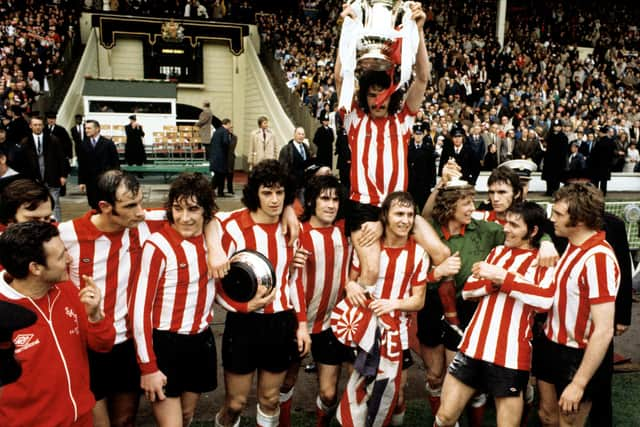How a flu-enforced lay-off may have sown seeds for Sunderland's incredible 1973 FA Cup triumph


Bob Stokoe's men were languishing in 19th place in the second division table when he replaced the sacked Alan Brown at the helm on November 23, 1972 and sparked a revival which was to take them not only into the top six, but also all the way to Wembley.
Ian Porterfield's goal beneath the Twin Towers famously clinched a seemingly-impossible win over the mighty Leeds on a day which has entered sporting folklore, and not only on Wearside.
Advertisement
Hide AdAdvertisement
Hide AdEnglish football is currently in shutdown in response to the ongoing coronavirus pandemic with most players currently training alone in order to maintain fitness levels.


However, club historian Rob Mason believes Sunderland's heroics 47 years ago may not have been possible had they not been forced to call a temporary halt.
He told the PA news agency: "I think that helped Sunderland enormously because Bob Stokoe had just taken over as manager.
"The manager had been sacked, they'd had a dire run. They'd lost their first game under Bob Stokoe at home to the team that went on to win the league, Burnley.
Advertisement
Hide AdAdvertisement
Hide Ad"The following week away to Portsmouth, they were losing until the last couple of minutes and came back to win 3-2. It was their first win since September and it gave everyone a bit of a lift.
"The following Saturday is a 0-0 at home, then they had this lay-off for however long it was, two or three weeks because there was a flu epidemic, and so for the remaining players, Bob had a chance to actually work with them, get them together, work on building up morale after the Portsmouth game, work on building up something to do with how they were going to play."
Writing in his autobiography years later, winger Dennis Tueart described the events of those few weeks.
Tueart said: "Within a couple of weeks of him (Stokoe) taking over, a flu virus spread right through the city and the entire club, and put most of us flat on our backs for several days at a time.
"I got it and simply couldn't move.
Advertisement
Hide AdAdvertisement
Hide Ad"It got into your joints and your muscles. It was the worst case of flu I've ever had. At one stage, there were only four players fit enough to train.
"As a result of the outbreak, the Football League postponed our entire Christmas programme, which allowed a period of settling in for Bob and Arthur Cox, and for them to get to know us as players as we filtered back into the training ground in dribs and drabs."
The 0-0 draw with Preston at Roker Park on December 16, 1972 was the last time the club played until January 6, when they announced their return with a 4-0 victory over lowly Brighton a week before launching their FA Cup campaign with a third-round trip to Notts County.
The rest is history.
County, Reading and Manchester City were dispatched after replays before Luton and then Arsenal fell by the wayside to hand the Black Cats their big day out at Wembley where - against all odds - they prevailed as goalkeeper Jimmy Montgomery repeatedly defied Leeds in spectacular fashion.
Advertisement
Hide AdAdvertisement
Hide AdMason said: "Stokoe has two or three weeks to work with the team, they come out and they get a 4-0 win and then they're up and running, because the next game after that is the first of the cup run away to Notts County.
"Their form in the second half of the season, in the league as well as in the cup, was just tremendous."